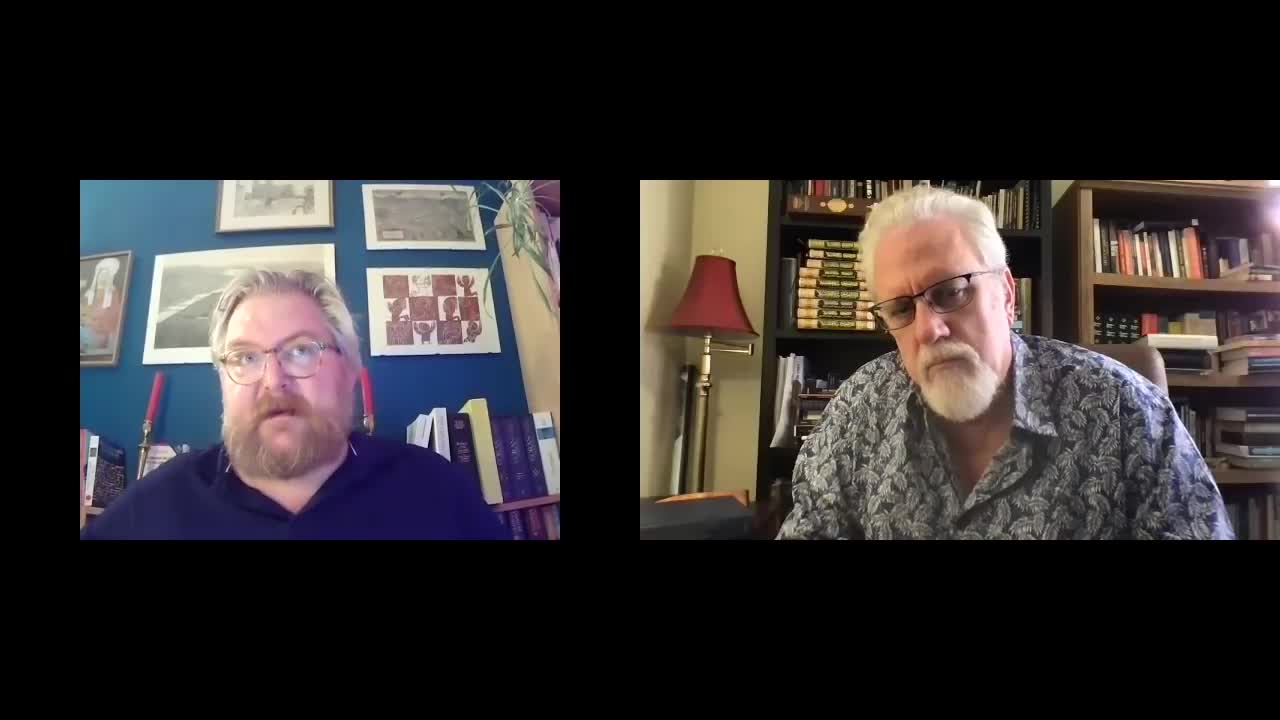Premium Only Content

NEW! Odon Lafontaine's views on Islam's Origins!
This is our first introduction to Odon Lafontaine, a Frenchman who has been researching the
origins of Islam since 2007, and has worked with the Belgian Priest and scholar Edouard-Marie Gallez (see his book 'Le Messie et son prophete', The Messiah and his prophet, and his website http://rootsofislamtruehistory.com/).
You can find out more about Odon on his YouTube channel: https://www.youtube.com/c/OdonLafontaine
Or go to his website: https://thegreatsecretofislam.com/
In this first episode Odon follows Gallez's thesis that in the 7th century, as the Byzantines and the Sassanians waged war against each other, there was a common belief that the end of times was near, and that the Messiah would soon return to usher in the apocalypse and establish God’s reign.
Odon believes that a 'Qur'anic Nazarene group' (neither Jewish nor Christian, but somewhere in between, who also referred to themselves as Judaeo-Nazarenes), lived up in the north, in what is today Syria, Iraq and in Jordan, and preached a millenarian creed to some of the Arabs ('Ghassanids', 'Lakhmids', and 'Nabataeans'), in order to conquer Jerusalem, rebuild its Temple, so as to trigger a 'physical' return of Jesus who would then establish a political kingdom.
But when Jesus didn't return, subsequent Arab rulers then divorced themselves from their Jewish and Christian roots, took upon themselves the task to establish God’s kingdom without the returning Messiah, whereupon they found new power and identity in that which separated them, which in turn then led to the creation eventually of Islam in the Abbasid era (thus in the later 8th - 9th centuries).
This thesis goes completely against the Standard Islamic Narrative (SIN) which starts from the premise that Islam began within a 22-year period by one man named Muhammad in central Arabia (the Hijaz).
To support his thesis, Odon uses the Qur'an literally, and finds that when you do, many important ideas which we find in the Standard Islamic Narrative just don't exist in its pages.
For instance, the prophet Muhammad is practically non-existent, and the city of Mecca is only referred to once.
Other ideas such as the 'Kaffirun' (unbelievers by today's reasoning) are really the 'coverers', or those who cover the sacred scriptures which speak about Jesus as the Messiah.
Another oddity is the reference to 'ahl-al-Kitab' which in the Qur'an refers to both Jews and Christians (and Muslims) in the original text, but its original meaning only refered to the Jews (the people of the Scripture, the people of the Law).
In fact, according to Odon, much of the text of the Qur'an has nothing to do with Islam at all, but more to do with Jesus and the millenarian creed of the Judaeo-Nazarenes.
What's more, Odon suggests that there was a 'proto-Qur'an' in existence in the 7th century made up of many layers of meaning, put together from an amalgamation of many previous texts.
This idea is not new, as it is supported by research from the two German scholars, Luling and Luxenburg.
This Proto-Qur'anic material was created by Arabic speaking Nazarene preachers who wrote notes for their sermons, as well as stories and instructions about their sermons, written in a sort of 'short-hand' (i.e. with only the skeletal 14 letters in the Arabic alphabet).
These short-hand instructions help explain why there were no diacritical marks used in the earliest manuscripts. When copied later in the 7th and 8th centuries, the later scribes continued to transcribe the text without the diacritical marks, and it is these manuscripts which we have today.
We know diacritical marks existed in the 7th century because they can be found in Egyptian Arab texts much further north.
Thus, the eventual Qur'an was merely an amalgamation of different layers of text taken from Bible commentaries and pseudo-historical narratives, as well as Christian narratives and Nazarene sermons.
When asked about an early 7th century Muhammad, Odon suggested that this was a title for a leader of men and a precursor of the Messiah (i.e. it means 'the coveted one' as in Daniel 10:11 & 10:19). Later, men like Abd Allah Ibn al Zubayr and even abd-al-Malik used it to refer to themselves.
We have much more to learn from Odon, so stay tuned as we bring more of his research on the
origins of Islam in the 7th century.
© Pfander Centre for Apologetics - US, 2021
(56,400) Music: "Country Girl" by aleksound, from filmmusic-io
-
 1:00:12
1:00:12
The Dan Bongino Show
4 hours agoBiden Is Destroying The Country On His Way Out (Ep. 2402) - 01/16/2025
553K1.1K -
 2:14:50
2:14:50
Steven Crowder
5 hours agoCeasefire in Gaza: How Trump's Influence Has Already Transformed the World
336K145 -
 2:03:50
2:03:50
LFA TV
19 hours agoTRUMP GETS THE CREDIT! | LIVE FROM AMERICA 1.16.25 11am
50.8K23 -
 31:14
31:14
Grant Stinchfield
2 hours ago $0.56 earnedBig Pharma Advertising Has Nothing to do With Selling Drugs... Instead It's a Pay Off!
10.1K1 -
 1:30:16
1:30:16
The Shannon Joy Show
5 hours ago🔥🔥Medical Kidnap In TEXAS! Mom Rachelle Suzanne: Medical City Hospital Persecuting Her Unvaccinated Son! 🔥🔥
19.4K -
 57:55
57:55
The Rubin Report
3 hours agoThe Unexpected Details of the Israel-Hamas Ceasefire & Who Should Take Credit?
79.6K34 -
 2:44:30
2:44:30
Benny Johnson
4 hours ago🚨 WATCH Pam Bondi BREAK Adam Schiff like a Pencil | Trump Confirmations Are On FIRE
103K67 -
 2:21:20
2:21:20
Ron DeSantis
5 hours agoGovernor Ron DeSantis Makes an Announcement in Orlando
167K4 -
 1:17:36
1:17:36
Graham Allen
6 hours agoDADDY’S HOME! Trump Lands Hamas Hostage Deal!! While Biden Tries To Take Credit! PATHETIC
95.3K70 -
 2:44:31
2:44:31
Matt Kohrs
13 hours agoBreaking Market News, Markets Breakout & Live Trading $1M || The MK Show
77.2K4